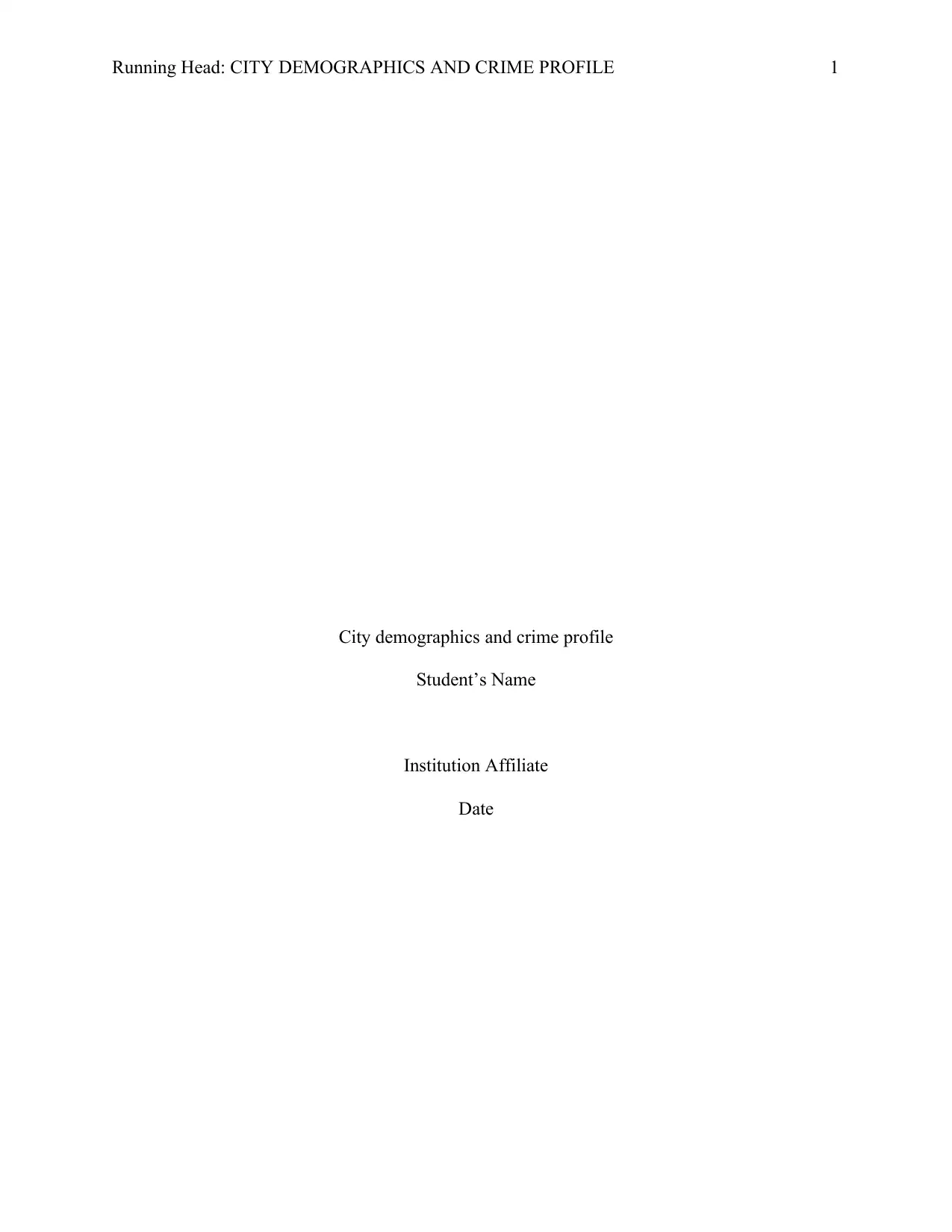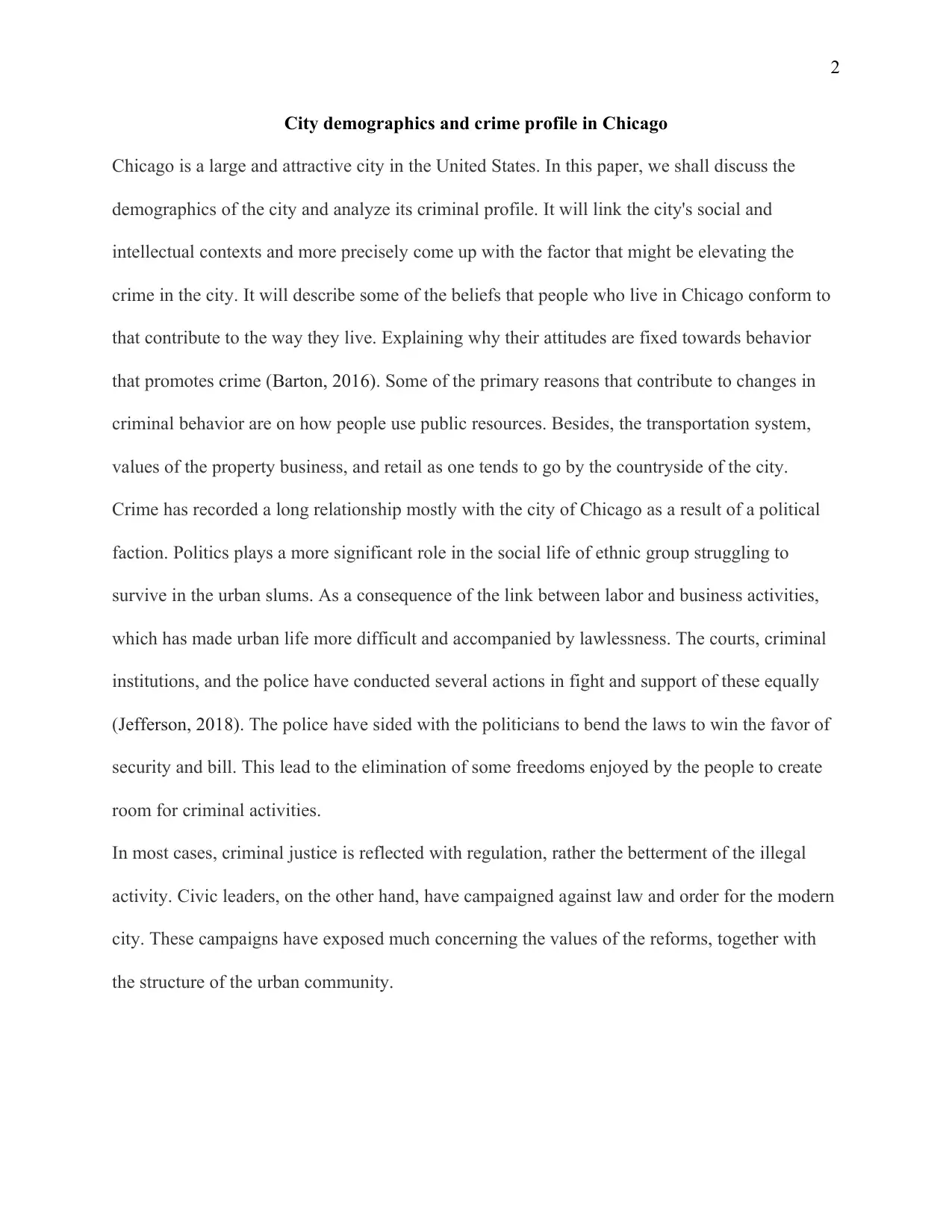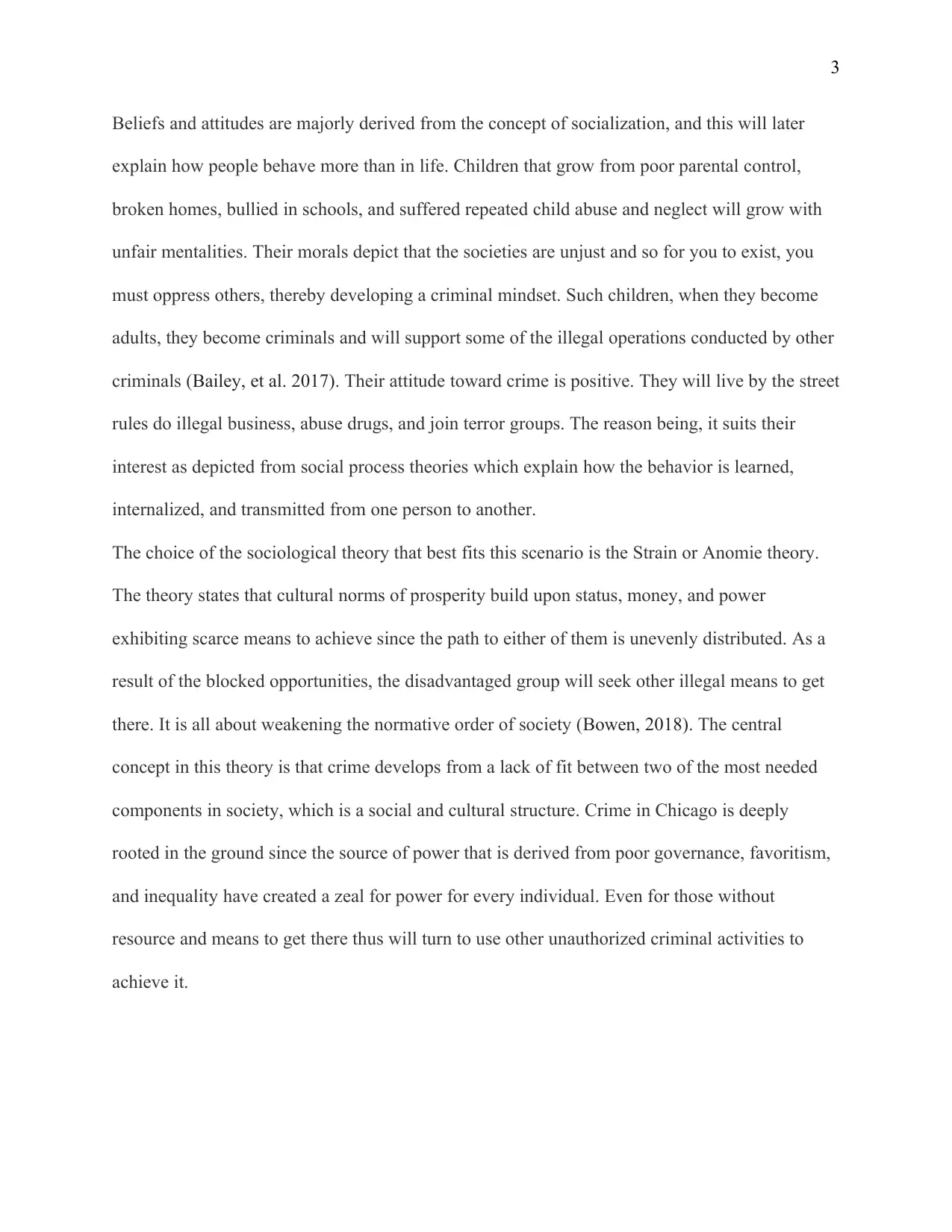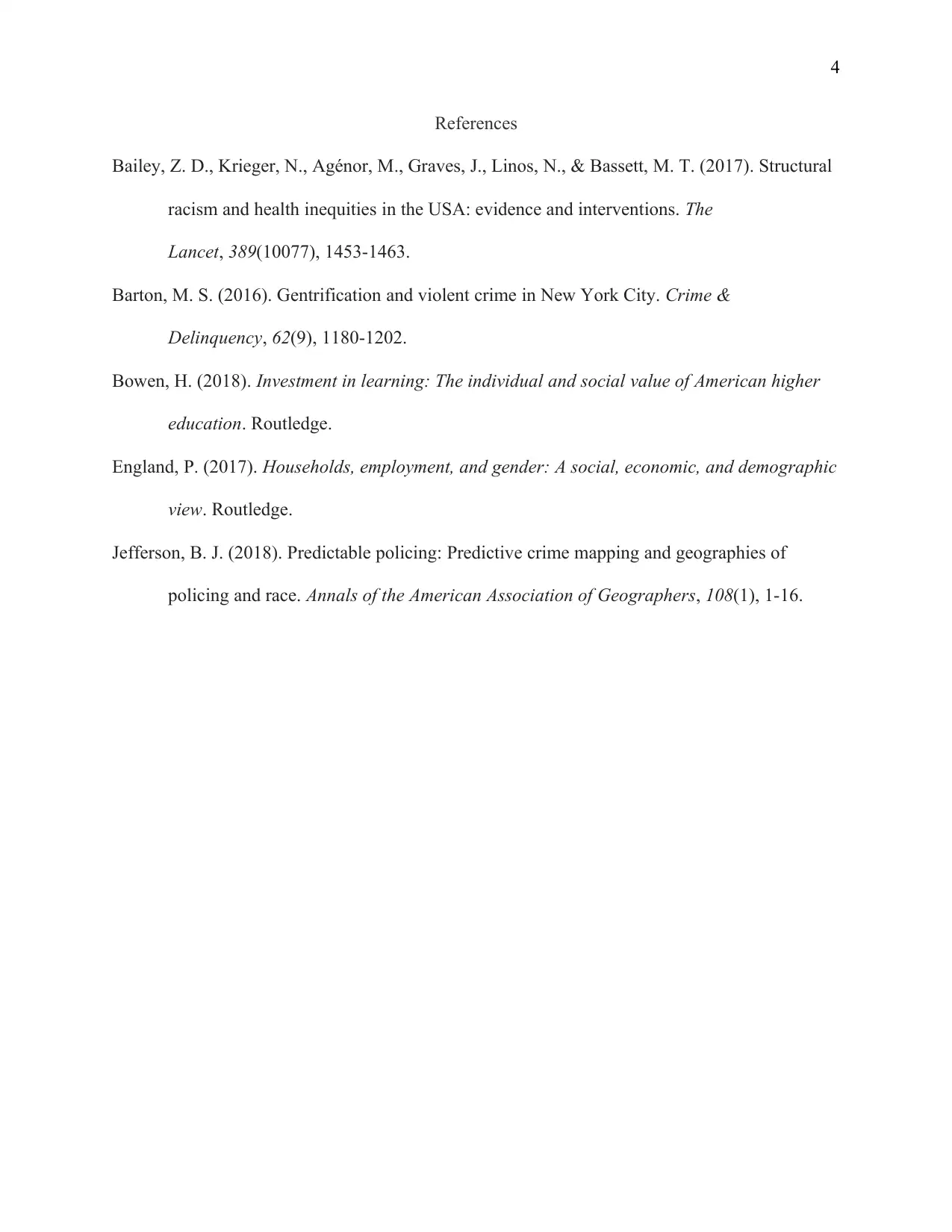Chicago Crime: Demographics, Beliefs, and Criminal Profile
VerifiedAdded on 2022/09/18
|4
|875
|29
Essay
AI Summary
This essay provides an analysis of Chicago's crime profile, exploring the city's demographics, social and intellectual contexts, and the factors that contribute to criminal behavior. It examines the beliefs and attitudes of Chicago residents and how these influence their actions, connecting them to the city's crime rates. The essay highlights the role of politics, the impact of broken homes, and the influence of social process theories, particularly the Strain or Anomie theory, in explaining criminal behavior. It argues that blocked opportunities and inequality drive individuals to seek unauthorized means to achieve power and status, thereby increasing crime. The paper references various studies to support its claims, offering a sociological perspective on Chicago's crime challenges.

Running Head: CITY DEMOGRAPHICS AND CRIME PROFILE 1
City demographics and crime profile
Student’s Name
Institution Affiliate
Date
City demographics and crime profile
Student’s Name
Institution Affiliate
Date
Paraphrase This Document
Need a fresh take? Get an instant paraphrase of this document with our AI Paraphraser

2
City demographics and crime profile in Chicago
Chicago is a large and attractive city in the United States. In this paper, we shall discuss the
demographics of the city and analyze its criminal profile. It will link the city's social and
intellectual contexts and more precisely come up with the factor that might be elevating the
crime in the city. It will describe some of the beliefs that people who live in Chicago conform to
that contribute to the way they live. Explaining why their attitudes are fixed towards behavior
that promotes crime (Barton, 2016). Some of the primary reasons that contribute to changes in
criminal behavior are on how people use public resources. Besides, the transportation system,
values of the property business, and retail as one tends to go by the countryside of the city.
Crime has recorded a long relationship mostly with the city of Chicago as a result of a political
faction. Politics plays a more significant role in the social life of ethnic group struggling to
survive in the urban slums. As a consequence of the link between labor and business activities,
which has made urban life more difficult and accompanied by lawlessness. The courts, criminal
institutions, and the police have conducted several actions in fight and support of these equally
(Jefferson, 2018). The police have sided with the politicians to bend the laws to win the favor of
security and bill. This lead to the elimination of some freedoms enjoyed by the people to create
room for criminal activities.
In most cases, criminal justice is reflected with regulation, rather the betterment of the illegal
activity. Civic leaders, on the other hand, have campaigned against law and order for the modern
city. These campaigns have exposed much concerning the values of the reforms, together with
the structure of the urban community.
City demographics and crime profile in Chicago
Chicago is a large and attractive city in the United States. In this paper, we shall discuss the
demographics of the city and analyze its criminal profile. It will link the city's social and
intellectual contexts and more precisely come up with the factor that might be elevating the
crime in the city. It will describe some of the beliefs that people who live in Chicago conform to
that contribute to the way they live. Explaining why their attitudes are fixed towards behavior
that promotes crime (Barton, 2016). Some of the primary reasons that contribute to changes in
criminal behavior are on how people use public resources. Besides, the transportation system,
values of the property business, and retail as one tends to go by the countryside of the city.
Crime has recorded a long relationship mostly with the city of Chicago as a result of a political
faction. Politics plays a more significant role in the social life of ethnic group struggling to
survive in the urban slums. As a consequence of the link between labor and business activities,
which has made urban life more difficult and accompanied by lawlessness. The courts, criminal
institutions, and the police have conducted several actions in fight and support of these equally
(Jefferson, 2018). The police have sided with the politicians to bend the laws to win the favor of
security and bill. This lead to the elimination of some freedoms enjoyed by the people to create
room for criminal activities.
In most cases, criminal justice is reflected with regulation, rather the betterment of the illegal
activity. Civic leaders, on the other hand, have campaigned against law and order for the modern
city. These campaigns have exposed much concerning the values of the reforms, together with
the structure of the urban community.

3
Beliefs and attitudes are majorly derived from the concept of socialization, and this will later
explain how people behave more than in life. Children that grow from poor parental control,
broken homes, bullied in schools, and suffered repeated child abuse and neglect will grow with
unfair mentalities. Their morals depict that the societies are unjust and so for you to exist, you
must oppress others, thereby developing a criminal mindset. Such children, when they become
adults, they become criminals and will support some of the illegal operations conducted by other
criminals (Bailey, et al. 2017). Their attitude toward crime is positive. They will live by the street
rules do illegal business, abuse drugs, and join terror groups. The reason being, it suits their
interest as depicted from social process theories which explain how the behavior is learned,
internalized, and transmitted from one person to another.
The choice of the sociological theory that best fits this scenario is the Strain or Anomie theory.
The theory states that cultural norms of prosperity build upon status, money, and power
exhibiting scarce means to achieve since the path to either of them is unevenly distributed. As a
result of the blocked opportunities, the disadvantaged group will seek other illegal means to get
there. It is all about weakening the normative order of society (Bowen, 2018). The central
concept in this theory is that crime develops from a lack of fit between two of the most needed
components in society, which is a social and cultural structure. Crime in Chicago is deeply
rooted in the ground since the source of power that is derived from poor governance, favoritism,
and inequality have created a zeal for power for every individual. Even for those without
resource and means to get there thus will turn to use other unauthorized criminal activities to
achieve it.
Beliefs and attitudes are majorly derived from the concept of socialization, and this will later
explain how people behave more than in life. Children that grow from poor parental control,
broken homes, bullied in schools, and suffered repeated child abuse and neglect will grow with
unfair mentalities. Their morals depict that the societies are unjust and so for you to exist, you
must oppress others, thereby developing a criminal mindset. Such children, when they become
adults, they become criminals and will support some of the illegal operations conducted by other
criminals (Bailey, et al. 2017). Their attitude toward crime is positive. They will live by the street
rules do illegal business, abuse drugs, and join terror groups. The reason being, it suits their
interest as depicted from social process theories which explain how the behavior is learned,
internalized, and transmitted from one person to another.
The choice of the sociological theory that best fits this scenario is the Strain or Anomie theory.
The theory states that cultural norms of prosperity build upon status, money, and power
exhibiting scarce means to achieve since the path to either of them is unevenly distributed. As a
result of the blocked opportunities, the disadvantaged group will seek other illegal means to get
there. It is all about weakening the normative order of society (Bowen, 2018). The central
concept in this theory is that crime develops from a lack of fit between two of the most needed
components in society, which is a social and cultural structure. Crime in Chicago is deeply
rooted in the ground since the source of power that is derived from poor governance, favoritism,
and inequality have created a zeal for power for every individual. Even for those without
resource and means to get there thus will turn to use other unauthorized criminal activities to
achieve it.
⊘ This is a preview!⊘
Do you want full access?
Subscribe today to unlock all pages.

Trusted by 1+ million students worldwide

4
References
Bailey, Z. D., Krieger, N., Agénor, M., Graves, J., Linos, N., & Bassett, M. T. (2017). Structural
racism and health inequities in the USA: evidence and interventions. The
Lancet, 389(10077), 1453-1463.
Barton, M. S. (2016). Gentrification and violent crime in New York City. Crime &
Delinquency, 62(9), 1180-1202.
Bowen, H. (2018). Investment in learning: The individual and social value of American higher
education. Routledge.
England, P. (2017). Households, employment, and gender: A social, economic, and demographic
view. Routledge.
Jefferson, B. J. (2018). Predictable policing: Predictive crime mapping and geographies of
policing and race. Annals of the American Association of Geographers, 108(1), 1-16.
References
Bailey, Z. D., Krieger, N., Agénor, M., Graves, J., Linos, N., & Bassett, M. T. (2017). Structural
racism and health inequities in the USA: evidence and interventions. The
Lancet, 389(10077), 1453-1463.
Barton, M. S. (2016). Gentrification and violent crime in New York City. Crime &
Delinquency, 62(9), 1180-1202.
Bowen, H. (2018). Investment in learning: The individual and social value of American higher
education. Routledge.
England, P. (2017). Households, employment, and gender: A social, economic, and demographic
view. Routledge.
Jefferson, B. J. (2018). Predictable policing: Predictive crime mapping and geographies of
policing and race. Annals of the American Association of Geographers, 108(1), 1-16.
1 out of 4
Related Documents
Your All-in-One AI-Powered Toolkit for Academic Success.
+13062052269
info@desklib.com
Available 24*7 on WhatsApp / Email
![[object Object]](/_next/static/media/star-bottom.7253800d.svg)
Unlock your academic potential
Copyright © 2020–2026 A2Z Services. All Rights Reserved. Developed and managed by ZUCOL.




